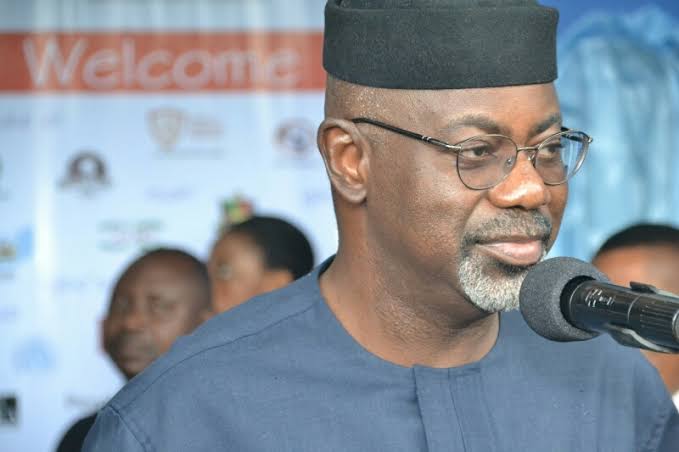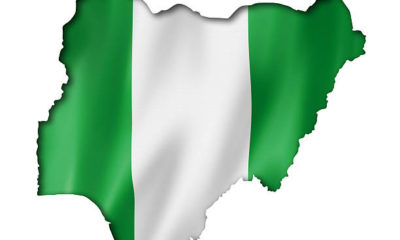Energy
At GOCOP Confab: Liyel Imoke says alleged expenditure of a phantom $16b delayed Nigeria’s power sector reforms

Imoke, who was also Chairman of the Power Sector Technical Board under the Obasanjo administration, stated this as a matter of fact in his keynote at the 8th Annual Conference of the Guild of Corporate Online Publishers (GOCOP), themed: “Nigeria: Tackling insecurity, power deficit, and transitioning to digital economy.”
Admitting that the National Electric Power Authority (NEPA), as it then was, was a monopoly, he said that electricity distribution was also a monopoly even as the execution of so many programmes faced various challenges.
He referred to the undue delay in implementation of the power sector reforms, which resulted from the probe of the claim of a phantom expenditure of $16 billion on the sector under the administration.
According to him: “The power sector probe took about two years. The delay led to huge cost overruns; doubling costs of various contracts awarded during my tenure. Several of these projects were delayed in completion. As we speak, we still have several IPP projects that are ongoing.”
He said that at the end of the probe, they found out that there was no missing $16b, but lamented that the alleged expenditure of the phantom $16b had been used as a political tool to criticize “those of us in government.”
Imoke fingered inadequate information as the trigger for the allegation, pointing out that, for instance, on his watch as Minister of Power, the actual spending was between $2b and $3b, much of which went to the original electric manufacturer.
The former power minister said that insecurity, power deficit, and the slowness in Nigeria’s transition to a full digital economy were challenges impeding national growth and development.
According to him: “These are challenges that impede our growth as a nation. They make us less globally competitive. If you look at electricity insecurity and digital economy and if we tackle these, we will be on our way to economic growth.”
He said to unlock Nigeria’s potential, the administration must tackle insecurity, noting that there had been insurgency and the emergence of Boko Haram, which split into ISWAP.
“We have experienced banditry, kidnapping, armed killings, mass kidnapping, and illegal mining. These days, we can’t go to a gathering of this magnitude without seeing someone who had been kidnapped before. This is one of our new realities,” he stated.
He implicated ethnic tension as a contributory cause of communal violence, adding that grievances in the Niger Delta caused a lot of insecurity in the region in the 2000s.
Imoke spoke about organized private crimes in the Gulf of Guinea, which created insecurity in the area and the separatist marginalization in the southeast region, leading to agitation
He stated that, for instance, between 2009 and 2020, insurgency by Boko Haram alone resulted in over 40,000 deaths.
Imoke listed poverty, high unemployment rate, which was in 1999 put at six per cent, in 2022 put at 22 per cent but which as of today is approaching 40 per cent, weak governance and corruption as well as climate change, as some of the factors that contributed or fuelled insecurity in the country.
He also listed proliferation of small arms and violent crimes across the country as a sore thumb, lamenting that there were more arms with some non-state actors put in their hands by desperate politicians and which at the end of elections, were not retrieved from them and on which they now depended to survive.
Saying that hope was not lost, Imoke declared that successive administrations had succeeded in degrading Boko Haram and recovering territories in the Northeast hitherto seized by the group.
According to him, “The military was able to degrade the group and reclaim the areas in the Northeast around Maiduguri.”
He listed other successes as the decrease in Boko Haram insurgency and deaths by 23 per cent according to the global terrorism index, adding that “there is also reduction of militancy in the Niger Delta as there is no more MEND in the region.”
He continued: “Oil production has significantly rebounded until recently because during the era of MEND, oil production dropped below 1.5 m barrels per day.
“There is anti-piracy measure launched through NIMASA and international collaborators to reduce the piracy in the Gulf of Guinea. Piracy decreased by 58 per cent between 2020 and 2021 in the Gulf of Guinea.
“In the Southeast, the arrest of Nnamdi Kanu is an achievement in the region…Nigerian government has increased its surveillance measures; its counter insurgency operation has been used in combating terrorism. We now have drone technology and others to attack security issues across the board. The persistent Boko Haram issue has been watered down, but there is a humanitarian issue. About 2.7m people have been affected. The UN said that 350,000 people have died as a result of insurgency.”
He, however, noted that Herder-farmers’ conflict was still ongoing, pointing out that over 2,600 people were reportedly killed in 2021 alone.
The former Cross River State governor said that continued separatist agitation had led to the death of police officers as well as IPoB members, adding that there had been extra judicial killings and arbitrary arrests, among others.
He said a multifaceted approach was required to effectively tackle security issues in Nigeria, recommending among others community policing, which should be legally regulated, deployment of vigilance groups in securing the communities, and giving consideration to decentralisation of security rather than centralisation that has not worked.
He also established a nexus between security and economy, arguing that “until we can address the state of our economy, we will not able to address security issues effectively.”
He stated that education, skill acquisition, entrepreneurship training, and access to SMES funding were key, adding that a strong and comprehensive rural development programme was necessary to address banditry and farmer-herder conflicts.
“I am a strong believer in peace and mediation. If the government can establish dialogue platforms between farmers and herders, it would reduce competition over land,” he said.
He also said that the procurement process must be transparent and resources should be deployed in the welfare and training of security personnel, adding that the nation’s judicial system must be able to tackle impunity.
While dwelling on power deficit, Imoke said that there was a lack of continuation of policies and programmes, pointing out that “your predecessor is your most valuable material. We always assume that our predecessor did not know anything, and there is a tendency to want to start afresh. It is important for me to always go back to my predecessor to ask for guidance.”
Admitting that electricity problem in Nigeria is the most humongous problem ever, Imoke said that with over 200 million Nigerians, the country’s installed capacity was like 13,000 megawatts. He said: “It sounds like good news, but we only manage to distribute an average of 4,000 megawatts whereas there are potential distributable 20,000 megawatts.”
He reeled out some sobering comparative statistics about per capita electricity consumption by Nigeria and some countries on the African continent based on recent data.
According to the data referred to by Imoke, “Nigeria per capita electricity consumption is between 150 and 200 kilowatts hours per year (kilowatts hour is the amount of electricity delivered to each household in the country in a year); Ghana is between 800 and 1000 kilowatts hour per year; South Africa is between 4000 and 5000 kilowatts hours per year while Ivory coast is between 500 and 600 kilowatts hour per year.”
Imoke lamented the Nigerian situation, adding that “these tell you the strengths of industrial bases of these countries.”
He, however, noted that despite numerous reforms in Nigeria, the power sector had continued to struggle.
Imoke asked if there was a solution in the face of growing demand? He resolved the question somewhat in the negative, pointing out that with the exponential growth in Nigerian’s population, there was a concomitant rising demand on the electricity supply.
On the transitioning to digital economy, Imoke said the growth in e-commerce platforms like Jumia and others was allowing for competition and efficiency.
According to him: “We are in the fourth industrial revolution, and it is a digital revolution. We missed out on the first, second, and third industrial revolutions. It is for us now as a nation, with a deliberateness of government policy, not to lose out on the fourth industrial revolution.
“All the three sectors-security, power and digital economy – are critical to our growth. The three are intertwined challenges that Nigerian must address to unlock her potential.
“With the collective effort of all, Nigerian can truly emerge as a global leader. Let us seize this moment to build a secure, electrified, and digitalized Nigerian that offers prosperity, growth, and development to all.”
Energy
Nigeria’s Gas Output Increases By 2.9%, Reaching 2.29 MSCF

Amid a slight increase in gas production, Nigeria’s oil output experienced a substantial rise in November 2024.
Gas production saw a 2.9% month-on-month (MoM) increase, reaching 2,292,951 million standard cubic feet (MSCF) from 2,292,471 MSCF in October.
However, on a year-on-year (YoY) basis, the growth was minimal, with a mere 0.02% increase in output for the first 11 months of 2024, compared to the same period in 2023.
READ MORE: Tinubu Mourns Ex-U.S. President Jimmy Carter, Celebrates His Legacy
The latest gas report from the Nigerian Upstream Petroleum Regulatory Commission (NUPRC) also revealed a 1.6% increase in domestic gas consumption.
A total of 606,658 MSCF was consumed locally, compared to 596,861 MSCF during the same period in 2023. Gas exports, meanwhile, rose by 6.9%, reaching 829,156 MSCF, up from 775,547 MSCF in the corresponding period of 2023.
This growth in exports continues to play a vital role in bolstering Nigeria’s foreign exchange earnings.
Despite these positive figures, sources close to the Ministry of Petroleum Resources (Gas) noted that oil remains the dominant force in Nigeria’s energy sector, with gas taking a secondary role.
On the other hand, the NUPRC’s oil production report revealed a remarkable surge.
Nigeria’s oil output, including condensates, rose by 13.3% year-on-year in November 2024, reaching 1.7 million barrels per day (bpd), up from 1.5 million bpd in November 2023. Month-on-month, oil production also increased by 10%, from 1.5 million bpd in October 2024.
Dr. Muda Yusuf, CEO of the Centre for the Promotion of Private Enterprises (CPPE), discussed the broader structural dynamics within Nigeria’s economy, highlighting the dominance of the non-oil sector.
In his 2025 Outlook, Dr. Yusuf noted that the non-oil sector contributed 94.43% to Nigeria’s GDP in Q3 2024, while the oil sector accounted for just 5.57%.
“However, the economy is characterized by a paradox of the oil sector contributing an estimated 90% of foreign exchange earnings, while the non-oil sector accounts for about 10%,” Dr. Yusuf said.
“This is a structural shortcoming in our economy which needs to be addressed, as sectors that contribute hugely to GDP have no corresponding contribution to foreign exchange earnings.”
He further emphasized the need to address the challenges faced by the non-oil sector, which include issues related to productivity, infrastructure, funding, and regulatory constraints.
“The policy implication is that more should be done to fix the challenges of productivity and competitiveness of the non-oil sector of the economy,” Dr. Yusuf added
Energy
JUST IN: NNPC Ltd Reopens Warri Refinery

The Nigerian National Petroleum Company Limited (NNPC Ltd) has announced that the 125,000-barrel-per-day Warri Refining & Petrochemicals Company (WRPC) in Warri, Delta State, has become operational.
This is coming about a month after the commencement of operations at the 60,000-barrel-per-day-old Port Harcourt Refinery.
The Group Chief Executive Officer, NNPC Ltd, Mele Kyari, made the disclosure during a tour of the facility on Monday.
ALSO READ: SERAP Urges Tinubu To Direct CCB To Publish President’s, VP’s, Others Assets
A video posted by Channels TV on Monday showed Kyari addressing a tour team, which included the Chief Executive Officer of the Nigerian Midstream and Downstream Petroleum Regulatory Authority (NMDPRA), Farouk Ahmed.
Before the tour commenced, Kyari explained that the inspection aimed to show Nigerians the level of work completed so far.
According to him, although the repairs on the facility are not yet 100 per cent complete, operations have commenced.
He said, “We are taking you through our plant. This plant is running. Although it is not 100 per cent complete, we are still in the process. Many people think these things are not real. They think real things are not possible in this country. We want you to see that this is real.”
Located in Ekpan, Uwvie, and Ubeji, Warri, the petrochemical plant produces 13,000 metric tonnes per annum (MTA) of polypropylene and 18,000 MTA of carbon black.
Commissioned in 1978 and managed by NNPC Ltd, the WRPC was built to supply markets in the southern and southwestern regions of Nigeria.
The mechanical completion of the facility was initially scheduled for the first quarter of 2024, according to the Spokesperson of the NNPC Ltd, Olufemi Soneye.
“Warri should be done by Q1 (first quarter) 2024,” Soneye stated.
The WRPC is one of Nigeria’s four refineries. Others include the old and new Port Harcourt Refining Company in Rivers State and the Kaduna Refining and Petrochemical Company in Kaduna State.
Energy
Dangote Partnership: MRS Urges Nigerians To Insist On N935/Litre Petrol Price Nationwide

MRS Oil Nigeria Plc, a prominent player in the Nigerian downstream oil industry, has implemented a new petrol price of N935 per litre across all its retail service stations nationwide.
The company has also called on Nigerians to monitor and report any outlets that fail to adhere to the new price structure.
Biztellers reports that this is consequent upon an announcement by the President of Dangote Industries Limited, Aliko Dangote, that the Dangote Petroleum Refinery has partnered with MRS Oil and Gas to offer petrol at N935 per litre at retail outlets, following a reduction in the ex-depot price from N970 to N899.50 per litre.
ALSO READ: Dangote Slashes PMS Price To N899.50k
It was gathered that MRS Oil Nigeria Plc has instructed all its outlets to implement the new price immediately, setting up a digital platform and monitoring team to ensure full compliance.
In a statement on Monday night, the company declared, “Petrol is now being sold at N935 at MRS Filling Stations nationwide. If you find any station not following this price, please report it. Call 08009447853 or email: NG-FMKPMGWHISTLEBLOWING@NG.KPMG.COM”
Emphasising the eco-friendly nature of its products, MRS Oil added, “We call on all petrol station owners to join MRS Oil Nigeria Plc in improving the supply chain of our beloved country, ensuring product quality and availability in every corner of Nigeria for the benefit of all Nigerians.”
In Lagos, commuters were seen queuing at MRS filling stations to purchase petrol, with many expressing their gratitude to the Dangote Petroleum Refinery and MRS Oil and Gas, urging other marketers to support the indigenous refinery rather than import off-spec products into the country.
A commuter at the MRS station at Alapere on the Lagos Ibadan Express way, Ibukun Phillips, could not hide her joy as her husband filled up their car.
“I am very happy today. This is a victory for Nigeria,” she said. “The price reduction is the best gift of the season. But beyond just the reduction, we are buying standard, eco-friendly petrol at a lower rate. My husband and I have decided we will only be using MRS from now on because we are confident in the quality of the product and supporting the economy.”
A commercial bus driver, Adio Ajibade described the price reduction as a great relief, especially during the festive season.
“The reduction is a great relief. It will reduce transportation costs and benefit Nigerians. God will continue to bless Alhaji Aliko Dangote,” he said.
A public affairs analyst and university lecturer, Dr. Tunde Akanni, said the collaboration between Dangote Petroleum Refinery and MRS Oil represents a significant step towards improving the affordability, quality, and sustainability of petroleum products in Nigeria.
According to Dr. Akanni, “this move will not only help ease the financial burden on Nigerians but also promote a more environmentally conscious approach to fuel consumption, benefitting both the economy and public health in the long term.”


















